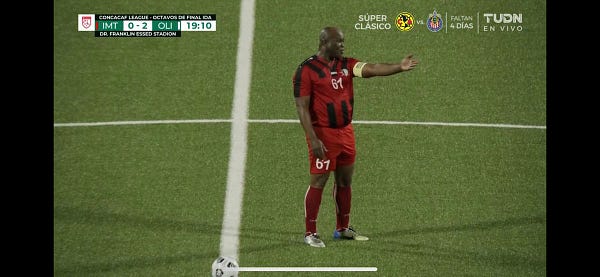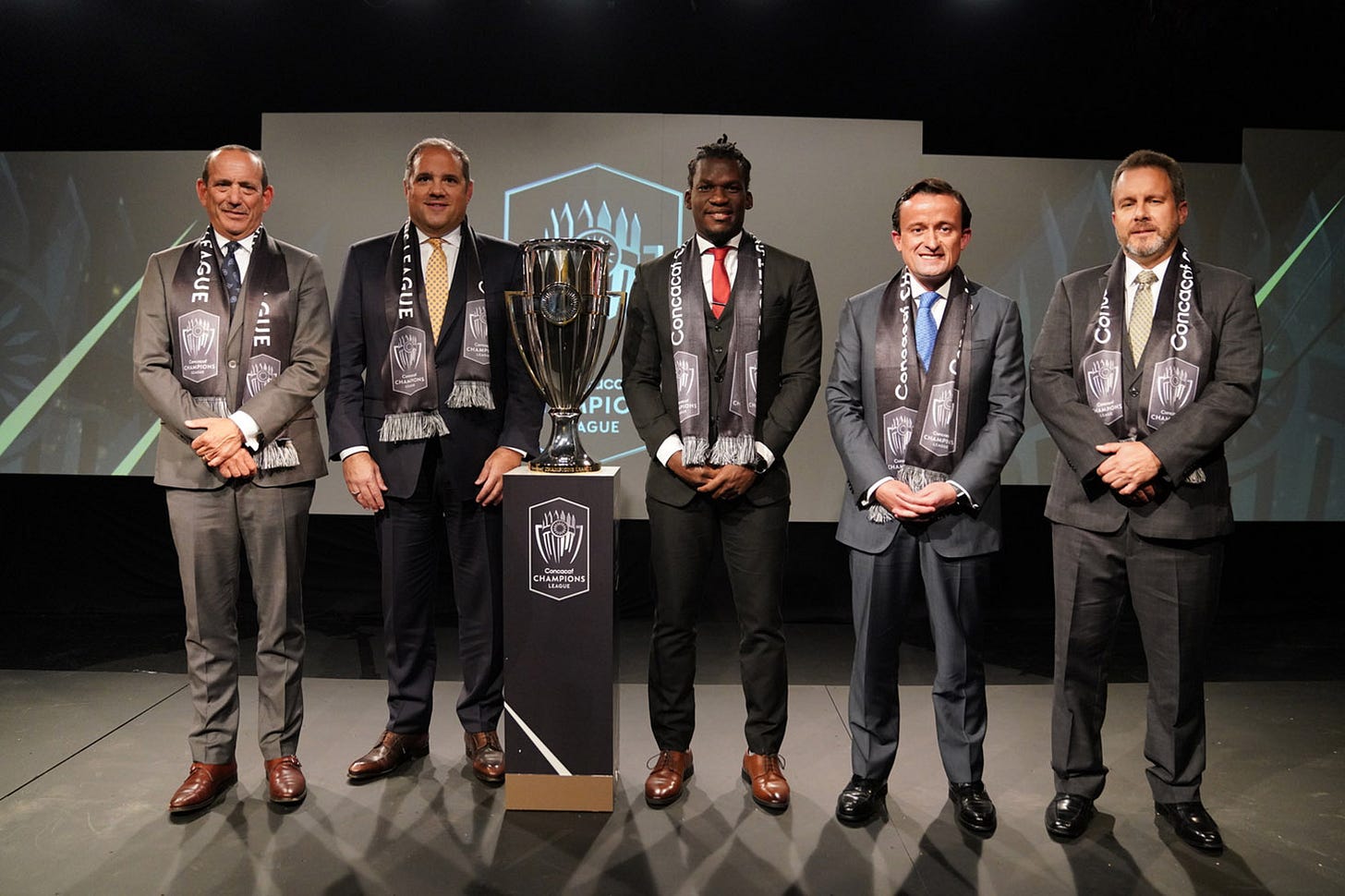🏆 CCL expansion plan keeps everyone singing from same hymn sheet for now
And, yes, the Suriname VP playing Concacaf League
While typically not this eventful, we run through everything that’s happening around the region every Monday in the Conca-catch-up, available only to premium subscribers.
Your subscription allows me to keep dedicating my time to watching Concacaf League and putting calls in to government offices looking for interviews after a politician plays in the competition.
Subscribe below! It’s only $5/month or $50/year, which is less than a buck per premium edition!
We knew the Concacaf Champions League would expand in 2023 and had a framework for how it would look thanks to an announcement in February.
That format already has been reworked with Concacaf announcing the details Tuesday.
Twenty-seven teams will land in the Concacaf Champions League each edition. Rather than the previously announced group stage, the regional competitions will be qualification for a first round and the knockout stage begins from there.

First, let’s look at what this does for the oft-forgotten teams in the Caribbean and Central America.
UNCAF President Rafael Tinoco and CFU General Secretary Camara David weren’t at Tuesday’s announcement just to get more men wearing suits on the stage.
Concacaf is honing in on regional competitions in both regions, something that both makes sense in terms of making competition more regional instead of the mish-mash of teams we see in Concacaf League (we’ll get to last night’s CFU v. UNCAF weirdness shortly) and also give teams more regular matches in international competition rather than the current sprint the Caribbean tournaments require.
We can’t leave these teams out.
Yes, Liga MX has won every single CCL final and MLS teams are the only ones that have made it to the final to come a step from stopping them lately. But even Olimpia’s semifinal run in 2020 is a reminder that sometimes Central American teams can hang. The amount of titles Central American teams won prior to the Champions League era also speaks to the quality of soccer that can be found in the region.
There are fewer spots in the new CCL for those teams, but it also is a solution far more elegant than the current Concacaf League format. The regional competitions give the cream the best chance to rise to the top. In Central America, 20 clubs go in and the top six will know they’re in CCL, able to reinforce in the winter if they choose or try to ride the momentum from the tournament.

Lots of attention has been paid to the massive Leagues Cup announcement made simultaneously, with MLS and Liga MX putting every team in the competition (which is yet to exceed four teams from each league) and pausing their domestic tournaments for a month to get the league done.


I’ve long said that rather than an actual fusion between the North American partners, Leagues Cup expansion would, in essence, serve as ‘the merger’. We’re now seeing that, with both leagues able to add to the number of quality games they’re offering both their national broadcasters and fans in the markets.
Could that tournament become more of a focus than the CCL? Maybe, but the Concacaf competition has far more history behind it and also the not insignificant cultural and sporting credibility of two-legged ties, requiring matches actually to be played in Mexico (or Central America/the Caribbean) rather than Leagues Cup which so far is taking place entirely in the U.S.
There also is a big carrot at the end of Leagues Cup that currently doesn’t exist. The top three teams go to CCL, with the winner getting one of five byes into the Round of 16, making it a Mario Kart style short cut to the continential tournament, especially enticing for teams struggling in their domestic seasons.
With the Leagues Cup expansion and the advent of the Central American and Caribbean tournaments, Concacaf has created similar parallel pathways for its teams to get in, even if there’s an outsized number of teams in the historically dominant North American region with 18 North American teams in compared to six from Central America and three from the Caribbean.
Concacaf also has managed to make sure local partners’ interests are served. Both MLS and Liga MX have plenty of reason$ for growing Leagues Cup and Central America and the Caribbean want their seats at the table.
Now, rather than a mega Leagues Cup usurping CCL as the premier event in the club calendar, Concacaf can continue to promote the fact that they sanction of the tournament (they also provide officials) while still noting teams in the Leagues Cup are battling for the chance to get into CCL.
Meanwhile, the Central American and Caribbean subregions can feel like their best teams actually have an opportunity to play their way into the tournament proper and make some noise once they get there.
Notably, as the confederation not-so-subtly put on display in New York City yesterday, everyone is currently all on the same page, singing from the same hymn sheet.
There’s still plenty of time for the Kumbaya moment to pass, but for now it’s a message of unity from Concacaf and those in charge of its leagues.
🇸🇷 Let’s talk about Suriname’s Vice President, who is 60, playing in Concacaf League
When I saw his name on the lineup sheet, I thought it had to be a mix-up on my part.
It’s well-known that Ronnie Brunswijk, the current Vice President of Suriname, owns Inter Moengotapoe, but it’s also well-known he has many children. Surely, this was just a junior getting a run out in the No. 61 shirt in the club’s biggest-ever match, a Concacaf League tilt with Olimpia.
Then, I cross-checked his birthday and, well, saw him, and I fired out this tweet. It since has been retweeted or quoted more than 3,000 times and aggregated by ESPN (23K have liked it on Twitter, take that Messi v. Ronaldo debates!), SI and outlets in France, Portugal, the UK and Turkey, among other places.


What started out as an embarrassing but ultimately harmless ‘Only in Concacaf!’ story took a different turn after the 6-0 Olimpia win in which Brunswijk went just shy of an hour as an ineffective central forward (I think that was the idea? Supposedly he was listed as a midfielder, but…).
Video streamed from the locker room after the match appeared to show the VP doling out cash from a bag to players and staff in the Olimpia locker room.

The video was streamed from the account of ‘Mony Hond’, legal name Joel Martinus. He is a member of the same political party as Brunswijk, recently serving as youth chairman of the ABOP. Like Brunswijk, he is a man of many interests with Wikipedia describing him as a “Surinamese football club owner, entertainer, convicted drug dealer and politician.”
Brunswijk also had a drug trafficking conviction hanging over him, though the Interpol warrant many have cited appears to no longer be current, at least from what I can tell searching the international law enforcement’s public Red Notice database. It also could still be active but no longer be publically listed.
It’s one thing if Brunswijk wants to register himself and play in a Concacaf League match - perhaps not the best advertisement for Concacaf’s second-tier regional club competition but something that only hurts his own team.
It’s another thing entirely to be giving cash to players after the match. It is that incident that has infuriated Concacaf (though I hear many in regional office weren’t too pleased with the initial stunt either), which released this statement Wednesday noting the Disciplinary Committee will open an investigation.
“We are extremely concerned at the content of a video circulating on social media which raises potential integrity issues surrounding the Concacaf League match between Inter Moengotapoe and CD Olimpia,” the statement reads.
“The matter is being referred to the Concacaf Disciplinary Committee who will commence a formal investigation and a further update will be provided when that process has concluded.
Remember, we’ve talked in the past about how Suriname’s tangled political network affects soccer at the national team level. It’s even more prevalent at the local level.
Handing out cash is nothing new for Brunswijk. In fact, it’s sort of his MO. He once flew a helicopter over a village in his home Marowijne district and dropped cash from it while also taking part in many less flashy but still concrete money handouts. He also, per the New York Times’ excellent profile on him published earlier this year, purchased new cars for the entire IMT team - which has to make it easier to give up your starting spot to a 60-year-old.
Nevertheless, it is not a good look, in any way, to be giving gifts to an opposing team after a competitive match, especially one from a region that has been wracked with match manipulation scandals. Whether or not that was a thought that even occurred to Brunswijk is not clear, but expect a stern slapdown from Concacaf leading to financial penalties or even a suspension from current and future tournaments.
One more twist to this story is the club probably shouldn’t even be in the Concacaf League. That’s not because of the level (though…the results somewhat speak for themselves) but rather because of how IMT qualified.
Typically, Surinamese clubs would go into the Caribbean Club Shield, the second-tier Caribbean club competition designed for teams in leagues not classified as professional. The champion of that tournament meets the fourth-place team in the Caribbean Club Championship, the competition for Caribbean teams in professional leagues, in a playoff to make the Concacaf League.
Because of the pandemic, however, this year both professional and amateur clubs were put into the same 13-team Caribbean Club Championship with the winner (Haiti’s Cavaly) going to the 2022 Concacaf Champions League and the runner-up (our friends from IMT) plus the two other semifinalists going into the Concacaf League.
Interview requests placed with the Vice President’s Press Office were not immediately returned, but I will, of course, let you know in future newsletters if I’m able to speak with any of the parties involved.
Mony Hand, play us out!







Canada got screwed in the new CCL. No chance for a bye in the knockout stages, and they do not have access to a “regional tournament.”
As an American, I want good, diverse and interesting soccer. The Leagues Cup doesn’t offer anything interesting. I was more excited about the “old” proposed format, which included group play with MLS, LigaMX, and CPL clubs. Now we get to watch LigaMX teams beat up MLS second stringers for a month (we all know MLS WILL NOT take it serious).